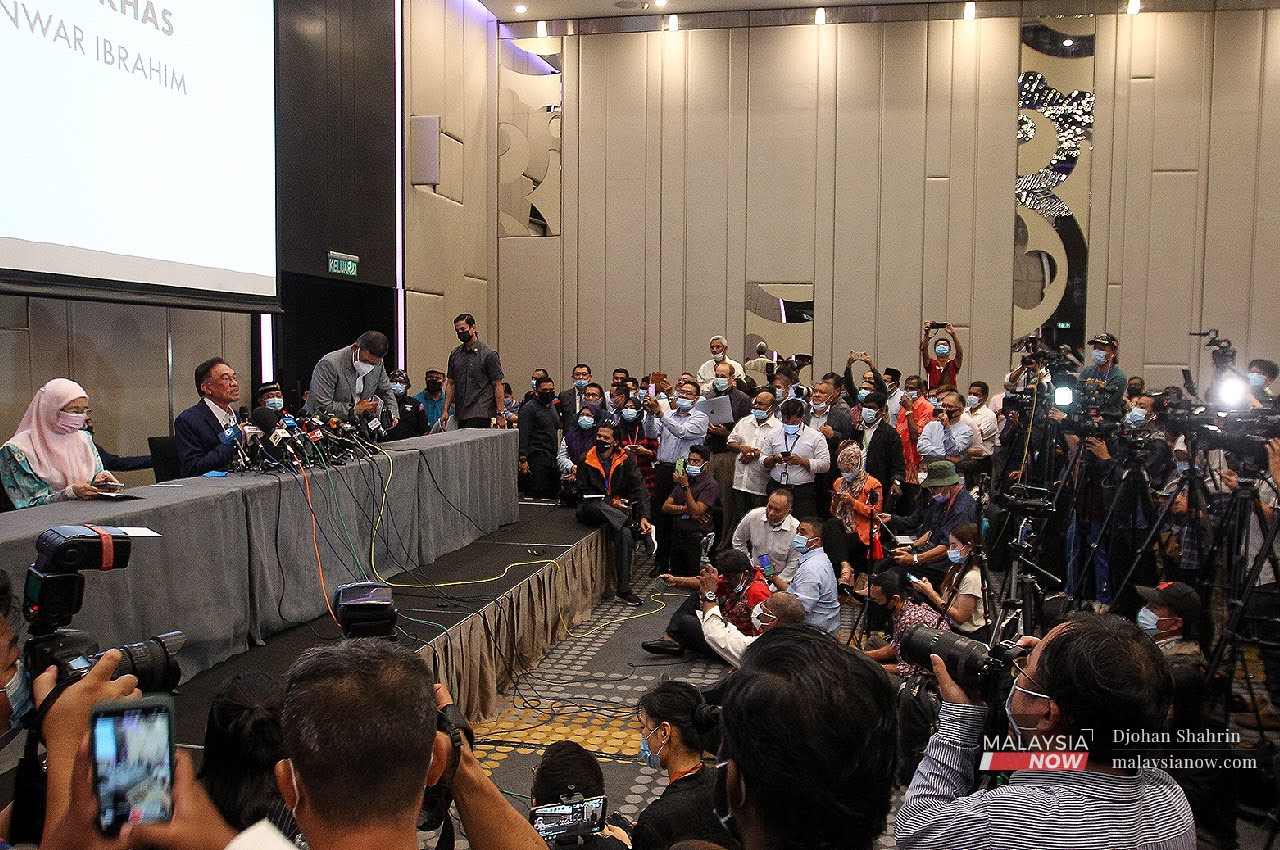Two Septembers, 12 years apart, and a common political narrative
A throwback to 2008, when a claim of massive defections got the public politically charged.
Just In
In the early hours of June 29, 2008, the Turkish embassy in Kuala Lumpur, located at the time in a residential-like bungalow in the leafy diplomatic enclave of Jalan U Thant, found itself dragged into a domestic quarrel when it received a prominent politician at its gates.
It was only hours later that his closest supporters would announce to the media the whereabouts of Anwar Ibrahim, who was waiting out the expiry of a ban on active politics following an earlier conviction of sodomy.
His supporters claimed he had been forced to seek refuge at the embassy after receiving credible intelligence on threats to his life.
“We received information that this was an attempt at killing not only his political career but also him,” Syed Husin Syed Ali, the deputy president of PKR who remains a staunch loyalist of the PKR president until this day, announced to the media.
The startling development took place just a day after a young staff member at Anwar’s office filed a shocking police report accusing the politician of sodomising him.
Anwar had described the accusation by Mohd Saiful Bukhari Azlan as a ploy to divert public attention from rising food and fuel prices by the government of Abdullah Badawi, who was facing pressure from his own party to resign following electoral losses.
At that time, Anwar was busy engineering defections from the ruling Barisan Nasional (BN), which months earlier was delivered a blow when it was denied its traditional two-third majority in the general election.
Five weeks after the dramatic events at the Turkish embassy, Anwar appeared in court, claiming trial to a charge of sodomy in what has come to be known as Sodomy II. The case was to last another six years, ending at the Federal Court with a five-year jail sentence for Anwar.
After he was charged, he wasted no time accelerating his plan to topple the BN government through massive defections which he announced about a month after the March 8 general election in 2008.
In that election, the opposition led by Anwar won 82 of the 222 seats, which meant that he needed 30 BN MPs to defect to his side.
Many were sceptical of his chances, but it was also thought that MPs could be bought, with those from Sarawak and Sabah said to be “readily available”.
Eventually, Sept 16 was fixed for the date of the defections, with rumours swirling of Anwar’s impending audience with the Agong.
“There was both fear and excitement, and every rumour was taken seriously,” said a seasoned politician who was at the forefront of the events of September 2008.
In the days leading up to Sept 16, a group of BN MPs left for a working visit to Taiwan, in what was seen as a move to stop them from communicating with the opposition.
But the PKR leadership dispatched a team to meet them.
Saifuddin Nasution, then the PKR strategy director, said they met the MPs and “had a good discussion”, while then information chief Tian Chua said they were “excited over the latest political development”. Both claims were denied by BN.
PKR said the BN MPs were planning to support then-Umno deputy president Najib Razak to take over from Abdullah.
“They told me if that failed, they would join Pakatan Rakyat,” Tian Chua was quoted as saying by The Star.
On the eve of Sept 16, in anticipation of D-day, the opposition Pakatan Rakyat comprising PKR, DAP and PAS, which had just taken control of Selangor, picked the Petaling Jaya Stadium in Kelana Jaya to mobilise tens of thousands to lend support to the planned coup.
“But of course, it was an anti-climax, and BN survived despite Abdullah Badawi’s resignation as prime minister,” the politician told MalaysiaNow, referring to Abdullah’s announcement on handing over power to Najib in March 2009.
He said it was important to study the events leading up to the Sept 16, 2008 episode in order to analyse Anwar’s announcement last week.
“In both situations, there was something to do with Anwar’s personal freedom,” he said.

On Sept 21, two days before Anwar’s press conference last week, the Kuala Lumpur High Court denied his bid to strike out a lawyer’s suit challenging his royal pardon.
In his suit, Mohd Khairul Azam Abdul Aziz said the Pardons Board’s decision to grant Anwar a royal pardon in May 2018, just a week after Pakatan Harapan took over the government, was illegal and invalid.
Anwar was freed from prison following the pardon, a promise that PH made during its election campaign with a view of eventually appointing him as prime minister.
Any decision to overturn that pardon would cost Anwar dearly, not only for his PH coalition, but also in terms of his personal freedom.
“This is where we see a striking parallel between now and the September 2008 episode, where a serious development on the allegation of sodomy against Anwar preceded his announcement of having the majority to form a government,” the same politician said.
Subscribe to our newsletter
To be updated with all the latest news and analyses daily.
Most Read
No articles found.
